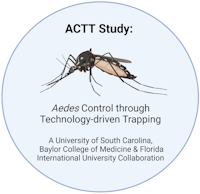Research
Ongoing Research
USC Institute for Infectious Disease Translational Research
This high priority four-year intramural research institute grant will construct new university networks to generate key scientific evidence on the pathogenic pathways leading to disease emergence and persistence. These key investigations bring together USC faculty in productive research collaborations to address disease transmission risk across the molecular-individual-population ecological scale. For more information, please visit our website: https://sc.edu/infectious-disease-institute.
Tick Surveillance
Ticks and tick-borne diseases have been on the rise nationally over the past two decades. The USC Laboratory of Vector-borne and Zoonotic Diseases works with state and federal partners to map and track ticks and their infections in our state. We collect ticks year-round from state parks, animal shelters and public submissions. Please stay tuned as we continue to update publications resulting from this work.
West Nile virus in Central South Carolina Study
West Nile virus is a mosquito-borne disease that can cause fever, meningitis or encephalitis is a small subset of infected people. No vaccine or treatment exists for West Nile virus, therefore prevention of mosquito bites is public health priority. Richland County, South Carolina is historically home to periodic West Nile virus outbreaks. A study in the summer 2023 found up to 22% of Richland County residents have antibodies for West Nile virus and a high proportion of mosquitos in downtown neighborhoods were positive for the virus. This early work suggests that central South Carolina may be a hotspot for mosquito-borne disease. More information
ACTT Study
The ACTT Study (Aedes Control through Technology Trapping) is a collaboration between the University of South Carolina, Baylor College of Medicine and the Florida International University. This study aims to improve vector control through development of remote sensing based forecast modelling programs and next generation mosquito traps. This five-year study funded by the National Institutes of Health collects mosquito data from Houston, Texas and Miami, Florida to inform geospatial modelling and sensor-based mosquito traps. More information can be found here: https://acttstudy.org.
STICK Study
The STICK Study (Sexually Transmitted Infection Concomitance and Kinetics) aims to define the epidemiology of multiple sexually transmitted infections in adolescents and young adults. Funded by the South Carolina SmartState Center for Healthcare Quality, this proposal aims to establish a prospective cohort to study the prevalence and incidence of concomitant TV and co-STIs (HIV, NG and CT) in a heavily burdened state. Further this study will biobank samples for translational research investigations to understand how host genetics, vaginal microbiome and immune responses vary by co-infection status and between disease phenotype.
Climate Change and Pediatric Health Study
Funded by the Burroughs Wellcome Fund, this project employs big data methods to elucidate the impact of three decade’s extreme weather events on early childhood development in the United States. This technologically innovative project leverages advanced computational and statistical methods to integrate >1.5 billion individual datapoints from restricted and publicly available datasets to evaluate the relationship between drought and temperature deviations on USA pediatric population’s development milestones at the neighborhood level.
ITALIC Study
The ITALIC study (Integrating Telemedicine and At-home evaLuatIon to Catalyze) is a three-year study funded by the Duke Endowment Foundation that seeks to test new methods for getting South Carolinians screened early for disease. This randomized control trial will evaluate the impact that at-home tests, telemedicine, and community health workers have on increasing the rate of early disease screening among vulnerable populations in our state. More information can be found here: https://allin-sc.org/italic/.

